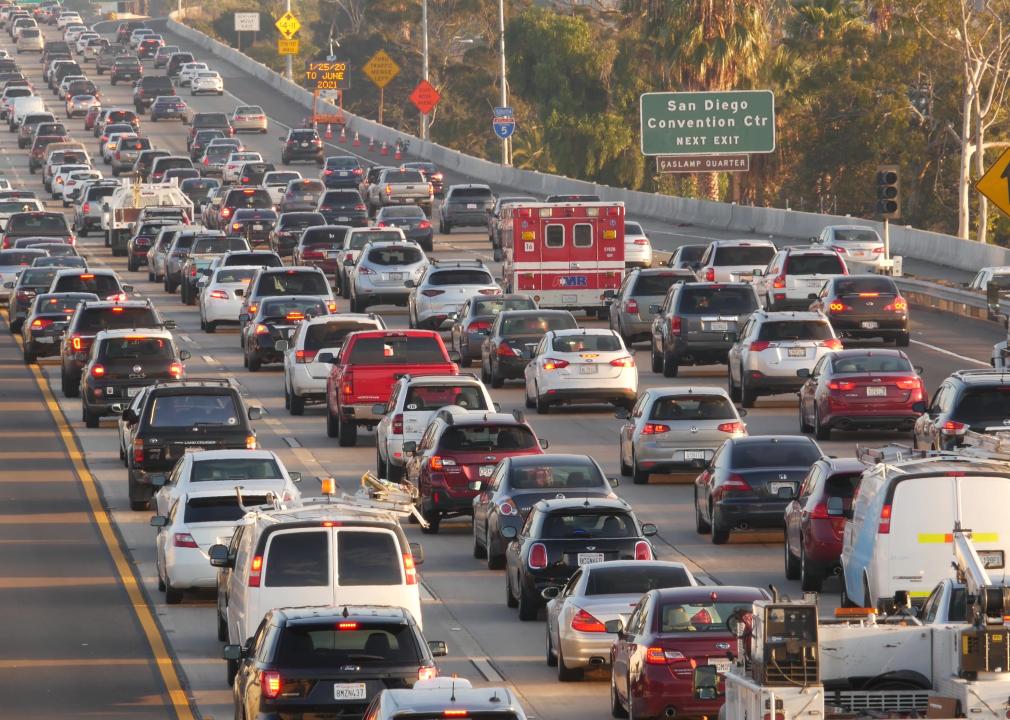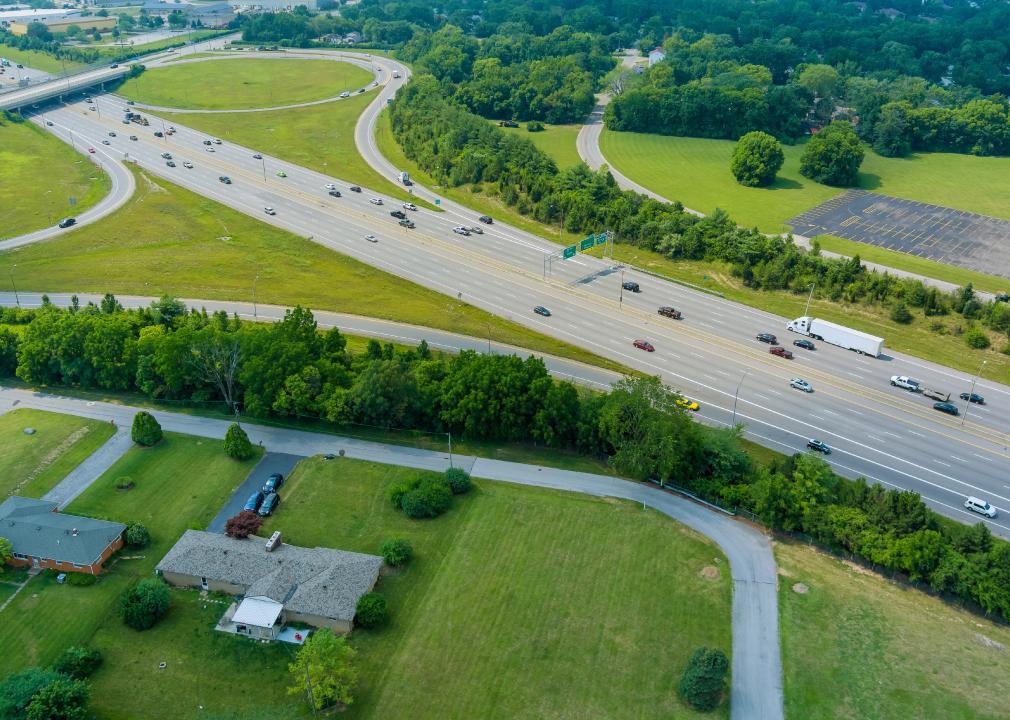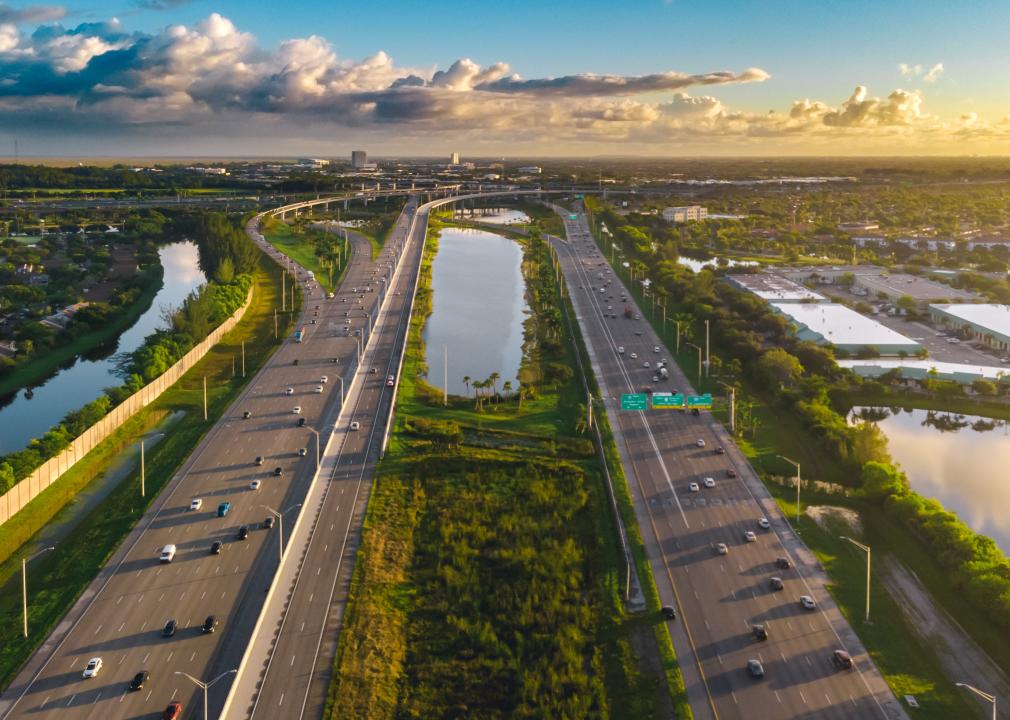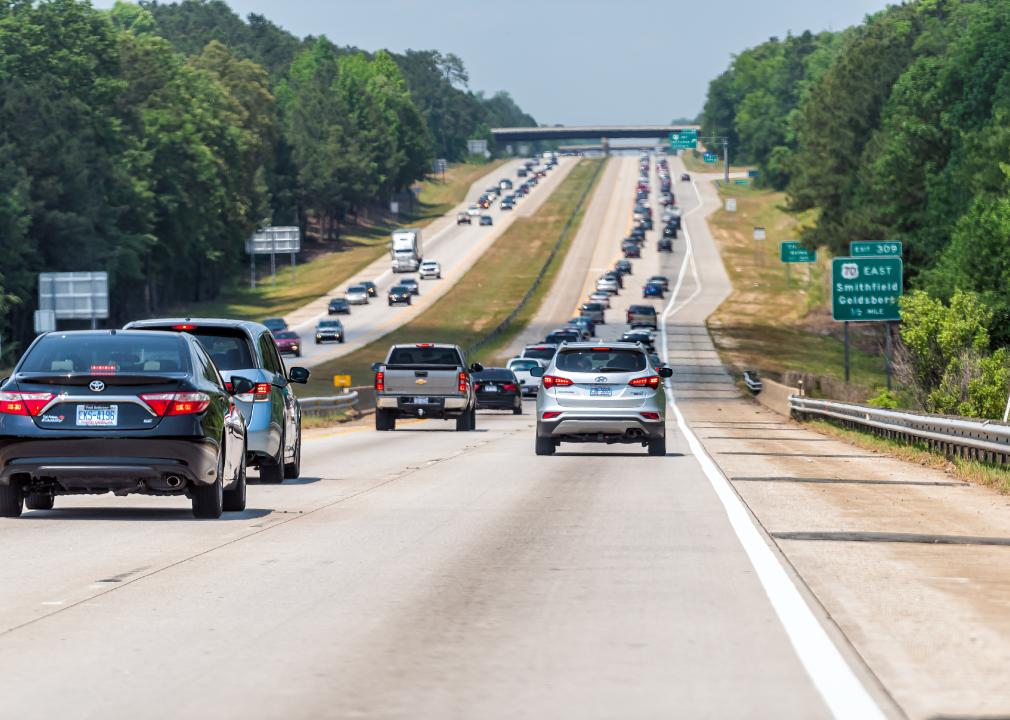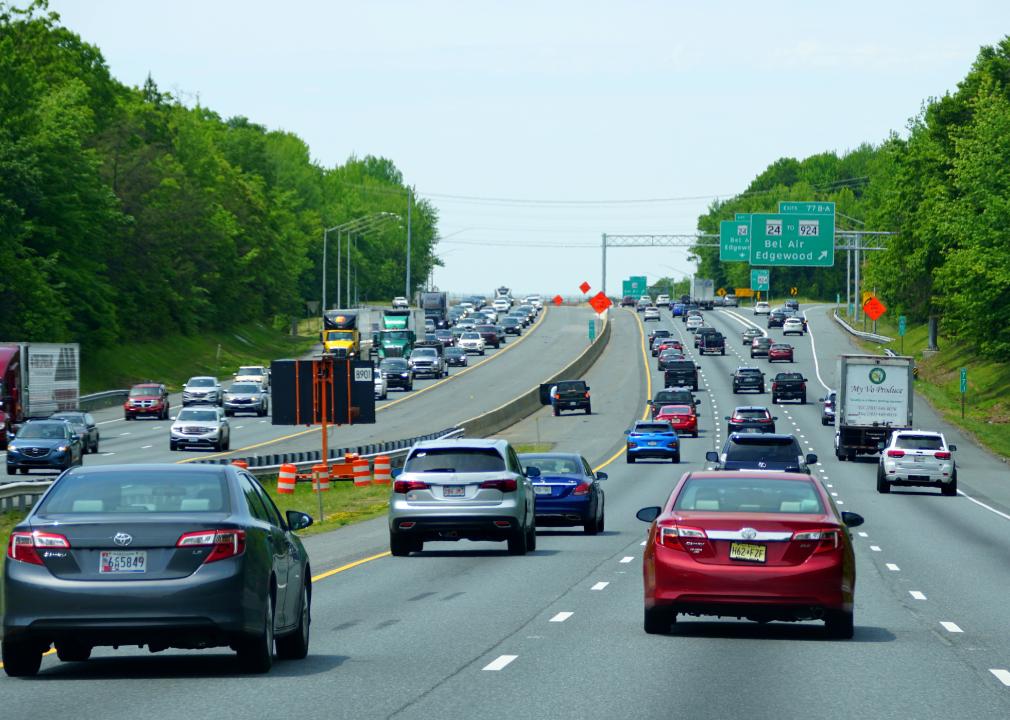10 interstate highways with the most fatalities
VDB Photos // Shutterstock
10 interstate highways with the most fatalities
Americans love the open road, and thanks to the Interstate Highway System—created in 1956—it’s relatively easy to traverse the country.
With an efficient way to travel (in theory), it’s no wonder interstates are in heavy use. In 2020 drivers drove over 709 billion miles on interstates. With that much traffic, there are bound to be a few crashes—35,766 in 2020, to be specific.
Stacker analyzed data from the National Highway Traffic Safety Administration’s 2020 Fatality Analysis Reporting System (FARS) to determine which interstates had the most fatalities. This data covers 38,824 total fatalities FARS recorded during 2020. Those traveling through Mississippi, Wyoming, and Arkansas saw higher incidences of fatality rates per 100,000 people.
The 2020 FARS data was released on March 2, 2022. To be included in this data, a crash must have occurred in the U.S. (including the District of Columbia and Puerto Rico), on a roadway open to the public, and there must be a fatality related to the crash within 30 days of the incident. For this analysis, we simplified the road where the accident occurred up to the interstate level. Meaning if the crash occurred on a portion of a state road that is also an interstate, it was considered to have happened on the interstate. On-ramps, off-ramps, and service and access roads were considered part of the interstate as well. Length of roadway was collected from the Federal Highway Administration.
You may also like: 25 terms you should know to understand the health care debate
![]()
Dogora Sun // Shutterstock
#10. I-15
– Fatalities: 133
– Fatalities per 100 miles: 9.3
This north-south interstate runs from San Diego to Sweet Grass, Montana, on the Canadian border. It’s the main route to drive the roughly five-hour trip from Los Angeles to Las Vegas. The open road continues on through the desert through Utah and Salt Lake City, where speed limits can hit 80 mph in some areas.
While Southern California is known for its sunny weather, rain and bad tires were probable causes for a February 2020 crash in North San Diego County where a bus slid off of I-15 and rolled down an embankment—killing three and injuring 18 people.
ungvar // Shutterstock
#9. I-70
– Fatalities: 134
– Fatalities per 100 miles: 6.2
To travel through the heart of America, drive I-70. It’s the east-west highway that goes through 10 states in the center of the country, from the outskirts of Baltimore, through Pennsylvania; West Virginia; Columbus, Ohio; Indianapolis; St. Louis; Kansas; and Denver, before it ends at I-15 in southwestern Utah.
West Virginia is nearing completion on its I-70 Bridges Project, a major renovation initiative in which the state is rehabilitating 26 bridges. Ohio is also replacing the superstructure of the I-70 bridge that spans the Ohio-West Virginia border between Bridgeport, Ohio, and Wheeling, West Virginia.
Roschetzky Photography // Shutterstock
#8. I-35
– Fatalities: 157
– Fatalities per 100 miles: 10.0
If you want to drive from the Mexican border to Canada, I-35 will take you most of the way. It starts in Texas and runs through San Antonio, Dallas, and Oklahoma City, before angling northeast to go through Kansas City, Missouri; Des Moines, Iowa; and Minneapolis before terminating at Duluth, Minnesota.
2007’s catastrophic I-35W bridge collapse in Minneapolis put a spotlight on America’s crumbling bridge infrastructure, which spurred more states to allocate funds to repair derelict bridges on all types of roads. Yet I-35 still sees a large number of fatalities every year, mainly due to driver error. One such fatality occurred in a construction zone in Oklahoma, when an inattentive semi driver plowed into an SUV, killing the driver.
Walter Cicchetti // Shutterstock
#7. I-5
– Fatalities: 193
– Fatalities per 100 miles: 14.0
On the West Coast, I-5 is the interstate that goes through all major cities from Mexico to Canada. The highway hugs the Pacific Ocean from San Diego to Los Angeles, then cuts inland through Sacramento, California; Portland, Oregon; and Seattle.
In Tacoma, Washington, I-5 has been under construction for literally decades to widen and realign the road, straighten a bottleneck-causing curve, and replace a bridge over the Puyallup River. The new bridge is a feat of engineering, featuring the biggest prestressed concrete girder in the entire country.
More capacity on this stretch can’t come soon enough, as heavier traffic and speeding has contributed to a 47% increase in fatal crashes between 2020 and 2021.
canbedone // Shutterstock
#6. I-20
– Fatalities: 203
– Fatalities per 100 miles: 13.2
I-20 branches off from I-10 in western Texas to run east through the heart of the South. Drive its full length, and you’ll go through Dallas; Shreveport, Louisiana; Jackson, Mississippi; Birmingham, Alabama; Atlanta; and Columbia, South Carolina, before the road ends at I-95.
On Sept. 29, 2020, a stretch of I-20 in Georgia experienced not one, but two fatal crashes. The first killed two on-duty county law enforcement officers when their car hit the back of a stopped tractor-trailer. Later that day, a nine-car pileup took the life of a 54-year-old woman.
This fatal day was not unusual—just two weeks earlier, a tow truck driver was loading a vehicle on I-20 and was killed in a hit-and-run accident.
You may also like: Oldest cities in America
Gchapel // Shutterstock
#5. I-80
– Fatalities: 220
– Fatalities per 100 miles: 7.6
At approximately 2,900 miles, I-80 is the second longest interstate highway in the U.S., stretching from Teaneck, New Jersey, to San Francisco. Along the way, it runs near Cleveland and Chicago, then through Des Moines, Iowa; Omaha, Nebraska; Cheyenne, Wyoming; Salt Lake City; Reno, Nevada; and Sacramento, California.
Wide-open spaces combined with snowy winters can turn this highway deadly. In December 2020, a massive snowstorm was responsible for a 66-vehicle pileup on I-80 in Clinton County, Pennsylvania. The crash involved 55 commercial vehicles and 11 passenger vehicles, and it stretched out for a mile. Amazingly, only one person died as a result of the crash; however, another person in the pileup died due to an unrelated medical issue.
The road blockage was so bad that rescue crews had to walk through the mess to help victims. It took days before cleanup crews could remove all of the vehicles from the road.
YES Market Media // Shutterstock
#4. I-75
– Fatalities: 246
– Fatalities per 100 miles: 13.8
Another north-south transcontinental route, I-75 goes from Miami to Sault Ste. Marie, on the Canadian border in Michigan’s Upper Peninsula. Drive it from end to end, and you’ll go through Tampa, Florida; Atlanta; Chattanooga, Tennessee; Lexington, Kentucky; Cincinnati; and Detroit.
To curb highway fatalities, the Michigan Department of Transportation (MDOT) implemented a statewide road safety campaign called Toward Zero Deaths. It posts driver fatalities on highway messaging systems in an effort to change driver behavior.
Another aspect of this program can be found on I-75 leading up to the International Bridge in Sault Ste. Marie. In 2020, MDOT installed a system of road sensors that detect traffic jams on the highway and flash warning signs to drivers.
Kristi Blokhin // Shutterstock
#3. I-40
– Fatalities: 270
– Fatalities per 100 miles: 10.6
America’s third longest interstate highway, I-40 goes from Wilmington, North Carolina, to Barstow, California. Along the way it connects to Nashville, Tennessee; Memphis, Tennessee; and Little Rock, Arkansas. As it hits Oklahoma City, it then runs along the same path as the historic Route 66 highway and connects to Amarillo, Texas; Albuquerque, New Mexico; and Flagstaff, Arizona, before going into the Mojave Desert, where it terminates when it intersects with I-15.
Speeding is one of the leading factors in fatal highway crashes, such as the 2020 crash in Iredell County, North Carolina, where a box truck crashed into a construction site, killing three workers.
However, the fatalities that happened on I-40 in 2020 weren’t all from speeding. Tire failure led to a collision that killed two in Arizona. In New Mexico, snow and icy roads contributed to a five-car pileup that killed two and injured several others.
Natalia Bratslavsky // Shutterstock
#2. I-10
– Fatalities: 325
– Fatalities per 100 miles: 13.2
For coast-to-coast highway travel in the South, I-10 is the route to take. It’s the fourth longest interstate highway in the U.S., stretching 2,460 miles from Los Angeles to Jacksonville, Florida. I-10 cuts through eight states and takes you through the metro areas of Phoenix, San Antonio, Houston, and New Orleans.
In late 2020, the state of Louisiana announced it would be replacing the Calcasieu River Bridge, a dangerous relic built in 1952 that experienced a jolt when Hurricane Laura blew a riverboat casino into it earlier in the year.
Khairil Azhar Junos // Shutterstock
#1. I-95
– Fatalities: 379
– Fatalities per 100 miles: 19.7
Along the East Coast, I-95 is infamous for bad traffic and accidents, but that might be expected with a highway that runs through 15 states from northern Maine to Miami. You’re bound to find major snarls going through Boston, New York City, Washington D.C., or Jacksonville, Florida.
In 2020, I-95 certainly earned its place atop this list, with a number of big fatal crashes up and down the coast, including a four-car crash that left two people dead in Delaware. However, the worst night on I-95 in 2020 may have been Nov. 1 in Rhode Island, when three people were killed in three separate crashes within 20 minutes.
You may also like: Most dangerous countries for journalists

